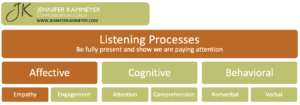Curiosity for Empathetic Listening
Listening with curiosity allows us to be empathetic and focus more on others than ourselves. Recently while getting yelled at, the thought crossed my mind, “I wonder what is going on for this person that they are raising their voice?” In this moment, I was practicing empathetic listening and was able to focus on curiosity instead of my own self-interest. I did not take it personally. Granted, this is not always the case, but it is a worthwhile intention to practice empathetic listening. When we listen empathetically, we demonstrate caring and encourage others to share, which gives them a sense of being worthy and gives us more valuable information.
Defining Empathetic Listening
It is helpful to define empathy, especially because it is a bit loaded in today’s vernacular. According to Psychology Today, empathy is “the ability to recognize, understand, and share the thoughts and feelings of another.” Empathy is different than sympathy, which is a concern for someone else, and different than compassion, which is an altruistic desire to act on a person’s behalf. The common analogy for empathy is the ability to put ourselves in another’s shoes.
As a frame of reference from our listening process framework, empathy falls within the Affective category, which addresses the emotional element of listening.
Empathetic listening is the skill of switching our listening lens from our own perspective to another person’s perspective. It is challenging for three key reasons: we are self-centered beings evolutionarily inclined to take care of our needs first, we live among many distracting stimuli, and we rarely stay in the present moment. Empathetic listening falls squarely in the listening challenge of our evolutionary self-centered tendencies as humans. When we listen, we tend to think about how what is being said affects us, and we tend to assume the person speaking is thinking about us. But in reality, most of the time all of us are thinking about ourselves. The antidote to the challenge of empathetic listening is curiosity.
Curiosity, or the desire to know more, is what allows us to shift our perspective from our own to another’s. Sometimes we are naturally curious and find what someone is saying interesting; in these cases, empathetic listening is easy. This tends to be when we care about the other person and they are speaking of something that expands an area of knowledge that already entices us. The good news is that we can use this experience to identify our own actions of empathetic listening and apply them to other situations, even difficult situations when empathetic listening may not come naturally.
Getting yelled at is a perfect example of a difficult situation. Most of the time when someone raises their voice, we think it is about us. We think that something we did or said made them yell at us, and we want to protect and defend ourselves against this upset. But, if we think back to times in life that we raised our voices, we may notice that there were many factors involved that were way broader than just what sparked the moment of yelling. While it is challenging, having curiosity about the person who is yelling allows for empathetic listening and can help diffuse the situation.
What it Looks Like to Listen with Curiosity
Listening with curiosity will look different for each of us, but there are some common techniques we can apply. This includes setting the intention to listen attentively until the other person has stopped talking; making verbal acknowledgement sounds such as ‘hmm’, ‘ahuh’, ‘ah’; and asking open-ended, non-judgmental questions. Just waiting for a person to completely finish speaking and allowing for a moment of silence can be very impactful. ‘Tell me more’ is a good statement to make after they finish, and it is even better when we can add the subject at the end, such as, ‘Tell me more about your experience on TikTok’, or ‘Tell me more about what is upsetting to you right now’. Examples of open-ended questions include ‘What was that like for you?’, ‘How did you feel after that?’, ‘What was the best thing about that experience?’, and ‘What was most difficult?’. If we are feeling a desire to act, then ‘What can I do to help?’ is a good question.
Practice: Listen with Empathy
When listening to others, practice wondering what they will say next and wondering more about the topic they are discussing. Imagine the benefit of expanding your knowledge through listening to the person speaking. With this mindset, practice the following actions:
- Notice how you listen to someone you like talking about a topic that naturally interests you.
- Apply those same actions in situations where you are less fond of the person and may even disagree with what they are saying.
- Wait for the person to completely finish speaking and pause for a moment.
- Ask open-ended questions, without judgement.
- If moved by compassion, avoid giving advice and instead ask ‘How can I help?’
Empathic listening is so beneficial and worth the effort. It is fine and normal that we will not always be able to apply this skill, and still, we can practice. What is wonderful is the unexpected things we may learn about the world and others through our curiosity.

